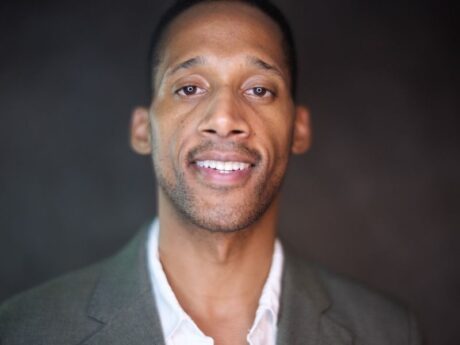In times darkly tinged by politically motivated violence, the play is a vitally important cautionary tale, one that Washington desperately needs.
If there ever was an actor meant to seize the stage in a role of authority, it is Virginia’s own Brandon Carter. Having established himself as a classical actor of considerable talents at Staunton’s American Shakespeare Center, he was the first Black actor to perform the entire three-play “Henriad” cycle (as Prince Hal in Henry IV Parts 1 and 2, and then in the title role as Henry V). His return to the Folger Theatre, after a turn as Friar Lawrence in Raymond O. Caldwell’s recent production of Romeo and Juliet, is auspicious, especially in times darkly tinged by politically motivated violence. He comes to our stage in a vitally important cautionary tale, one that Washington desperately needs at this historical moment.
Carter’s upcoming turn in the title role of Al Letson’s Julius X offers a bold re-imagining of Shakespeare’s Roman classic, from a distinctly American perspective. Inspired in equal parts by the Bard’s take on Julius Caesar and by the legacy of Malcolm X (himself the victim of an insider assassination plot), the play emphasizes the humanity of a semi-fictional African American leader whose journey from the lower depths to public prominence is by turns inspiring and cautionary.

The play’s opening words summarize the unique combination of history and fiction that lies at the heart of the drama: “This is not a story you know, but somewhere in between.” As Carter himself stresses, “This is not a story of Malcolm X in particular; it has elements from it, but it also has elements from Al Letson’s mind, and elements from Julius Caesar.”
What theater does best, always does best, is to bring seemingly familiar figures to life, and give them a depth well beyond the confines of the two-dimensional legend we have come to know. “What I love about plays like this,” says Carter, “I love seeing plays where there’s a possibility that this person was human. I think we don’t have many accounts of that in history where we see figures as human. We might think we know about figures like Malcolm or Julius Caesar, but Shakespeare wants to show us another aspect, and Al Letson wants to show us even more.”
Growing up in what Carter characterizes as “more of a Dr. King family,” he never realized the challenges Malcolm faced as he grew up. Carter recommends that audiences dive into Malcolm X’s autobiography (co-authored with Alex Haley), because it is there that we can appreciate the challenges Malcolm faced from a very early age. His father, part of Marcus Garvey’s Pan-African movement, was murdered when Malcolm was just a boy, and that loss led directly to the devastating loss of his mother to mental illness. After years in Boston and then as a hustler in Harlem, Malcolm ended up in prison — where, newly driven, he devoted himself to self-education, self-reconstruction, and conversion to Elijah Muhammad’s brand of Islam. It is during this time that he rejects his birth name, Little, and adopts the famous “X” as a reminder that, as a man descended from enslaved Africans, his true name and ancestry were stolen from him.
As Carter says, “I didn’t know how Malcolm X was at the bottom of the bottom. I knew that he went to prison, but I didn’t know about his full experience: that he went through all of that to become the man that we know, the icon that is as much known as the face. The ‘X’ is known just as much as James Dean and Marilyn Monroe, but we actually don’t know the person, and in the depictions of him, we have a version of him, and that’s not truly him.”
The language of Letson’s treatment of Malcolm/Julius X is planted firmly in the worlds of jazz and hip-hop; although this might require some attitude adjustment, we must remember that the iambic pentameter we associate with Shakespeare was the hip-hop of his generation. Elizabethan bards used pentameter as their beat-box, syncopating, rhyming, and singing their stories to spellbound audiences in London’s Globe and beyond. Music, and a dynamic relationship with the audience — which routinely talked back to the actors throughout the show — was the essence of the Globe Theatre experience, and it’s one that director Nicole Brewer is actively working to re-create at the Folger.

As for the rehearsal process, Carter can’t say enough about director Nicole Brewer’s generous spirit: “I love Nicole’s [rehearsal] room, I love rooms like that, and I think her experience in anti-racist theater, and her intention to re-mix the space, it’s just vital to making sure that Shakespeare adaptations like this are treated like a new play, because everyone’s bringing their different sides. We’re all strangers coming to this place and bringing our different experiences to tell a story. I think her room in particular needs this because of the improv nature of hip-hop and jazz.”
Given the tensions of Malcolm’s days, tensions we are all too familiar with today as shots continue to ring out against leaders of the right and the left, another anchor for Julius X is the need to take a deep breath and reflect on the central character’s humanity. As Carter puts it, “I think the main thing I got from Brewer from the beginning was this is a story of brotherhood and of love, and I think that he led the way to how we’re sharing this piece. I just want to honor the guy; I know it’s not Malcolm X precisely, but it is Malcolm X, and I want to give as much honor to him and the story as I can.”
He also hints at Shakespearean treatments he’d like to see in the not-too-distant future: “There aren’t many opportunities to play a legend, you know, unless Obama comes along, you know, hint-hint, you know, there’s not a lot of opportunities to play this, so it is important to me, there’s a responsibility to honor the guy. Malcolm is a little bit more of a humble leader. And I think we get that side of his humility, whereas Julius Caesar is more of the arrogant, self-righteous guy where you want this guy to go.”
Carter also understands the ways in which internal politics drive the plots and counter-plots for both of the stories that meet in this play. And the lessons of both times inform our extremely volatile present. “Rome fell from within. The [Black Muslim] brotherhood fell from within. That is something you can’t escape from; you’re layering this on the remix of this play. It becomes a cautionary tale; when people talk about shutting it down and taking people out, there are consequences. We don’t run from that in this production, and I think this is what makes the Folger a great place to be right now.”
This upcoming production also represents a culmination, of sorts, because of the invaluable contribution Brandon Carter made to Virginia theater after his recent turn as artistic director at the American Shakespeare Center. His leadership, through deeply troubling times at the Blackfriars Playhouse, helped to guarantee that it could survive and thrive, after crises that have crippled professional companies nationwide. That Carter rose to the challenge armed with not just performing arts chops but a minor in Strategic and Organizational Communications from his alma mater, Longwood University, seemed more than fortuitous; there was something about it that seemed destined to be a good fit.
Make no mistake: this production will be one that defines the 2025/26 season here in Washington, DC, and Brandon Carter is more than up to the challenge. Be there.
Folger Theatre’s production of Julius X plays from September 23 to October 26, 2025, at the Folger Shakespeare Library, 201 East Capitol Street, SE, Washington, DC. Accessible performances and related programming will be offered throughout the run of the production and are listed on the show page. Tickets ($20–$90) are available online at www.folger.edu/juliusx, by calling the Folger Box Office at (202) 544-7077, or through TodayTix.
SEE ALSO:
Folger Theatre announces cast and creative team for ‘Julius X’ (news story, August 26, 2025)

